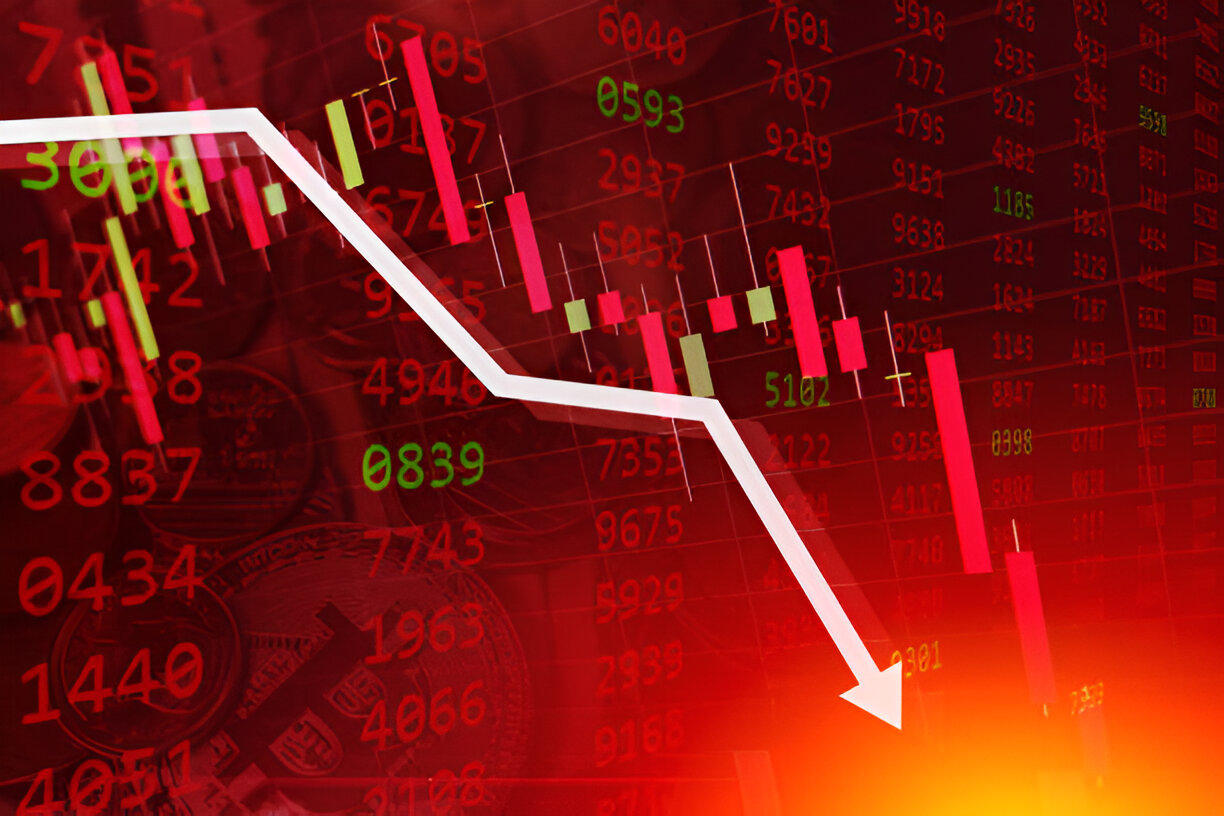Shares of PowerGrid Corporation of India and JSW Steel have faced significant downward pressure in recent weeks, emerging as two of the top losers in the stock market. Weak fundamentals, coupled with unfavorable news flow, have weighed heavily on investor sentiment. Despite their positions as industry leaders in their respective sectors, several factors have contributed to this trend, leaving analysts and investors pondering over their future outlook.
Why PowerGrid Shares Are Falling
PowerGrid Corporation of India, a leading state-owned power transmission company, has seen a steady decline in its stock price over the last few weeks. While the company has long been lauded for its critical role in India’s power infrastructure, recent performance has left investors concerned.
Negative Fundamentals
One of the key reasons behind PowerGrid’s recent challenges lies in weaker fundamentals. The company, which commands a significant share of India’s power transmission network, has been under pressure due to regulatory changes and rising operational costs. Industry experts have highlighted concerns regarding reduced regulated returns, which were recently proposed by the Central Electricity Regulatory Commission (CERC). This regulatory shift poses challenges in maintaining profitability and ensures lower compensation for PowerGrid than what was previously anticipated.
Uncertainty in Global and Domestic Economic Conditions
Additionally, broader macroeconomic factors have impacted PowerGrid’s performance. Elevated borrowing costs, linked to tighter monetary policies globally and domestically, have also taken a toll on the company’s margins. With significant debt tied to its infrastructure expansion projects, the burden of servicing this debt has added to the financial strain. The weakening of the rupee against the dollar has further compounded this issue, as the company has foreign currency loans on its balance sheet.
Concerns About Future Growth
While PowerGrid has continued to invest in expanding its network, concerns remain about the delayed execution of projects and its impact on earnings growth. Market experts note that while its core business remains stable, the overall sentiment toward the company has turned cautious. The growing push for the privatization of transmission infrastructure has also intensified competition, which could erode PowerGrid’s dominant position over time.
What’s Pressuring JSW Steel?
JSW Steel, one of India’s largest steel producers, has also emerged as one of the top losers amidst a volatile period for commodity markets. The company’s share price has been impacted by a combination of domestic and international factors that have cast a shadow over its recent operations.
Steel Price Volatility
Fluctuating steel prices in global and domestic markets have brought uncertainty to JSW Steel’s profit margins. Over the past several months, steel prices have witnessed significant variations, reflecting global demand-supply imbalances and economic uncertainties. Weak export demand due to sluggish overseas economies has exacerbated these issues, while competition in the domestic market has placed additional pressure on performance.
Rising Input Costs
JSW Steel’s profitability has also come under strain from rising input costs, primarily linked to coking coal and iron ore—key raw materials for steel production. Although the company has taken steps to secure raw material supply through both market purchases and captive mines, spiraling costs have impacted its operating margins. This trend is particularly concerning given that steelmakers across the globe are facing similar challenges.
Sustained Debt Levels
Another factor weighing down JSW Steel is its substantial debt. The company’s aggressive capacity expansion plan, while commendable in the long term, has resulted in an elevated debt burden. With borrowing costs rising, servicing this debt has become increasingly challenging, raising concerns about the company’s ability to maintain growth momentum while managing financial stability.
Recent Negative News Flow
Both PowerGrid and JSW Steel have been in the headlines for reasons that have added to investor unease.
PowerGrid in the Spotlight
For PowerGrid, regulatory developments around return on equity (ROE) recently garnered attention. Proposed reductions in the ROE allowed for electricity transmission companies could mean lower returns for PowerGrid, a key concern for analysts and shareholders alike. Additionally, the company’s slower-than-anticipated progress on renewable energy-driven transmission projects has raised questions about its readiness to adapt to India’s evolving energy landscape.
Challenges for JSW Steel
JSW Steel, on the other hand, has been navigating geopolitical and trade policy uncertainties, contributing to negative sentiment around its stock. With a significant share of its revenue tied to exports, the company faces challenges stemming from global trade tensions, particularly involving steel tariffs in key markets. Furthermore, scrutiny from environmental watchdogs over the carbon footprint of its operations has amplified concerns about the potential for regulatory restrictions on its production capacity.
The Future Outlook for PowerGrid and JSW Steel
While both stocks have struggled in recent weeks, analysts believe their long-term outlooks are not entirely bleak, particularly for investors with an appetite for risk and a long-term view.
PowerGrid Corporation of India
Despite its recent challenges, analysts remain cautiously optimistic about PowerGrid’s prospects. The company’s strategic role in India’s transition toward a sustainable energy grid is significant. Its ongoing efforts to expand its network of transmission infrastructure and invest in projects with renewable energy integration present opportunities for future growth.
However, PowerGrid will need to manage key obstacles, including tighter regulatory frameworks and rising cost pressures. Additionally, the company’s ability to leverage privatization-driven opportunities while remaining competitive in a crowded space will determine its success moving forward.
According to experts, a gradual recovery is expected for PowerGrid’s stock as the company navigates these challenges. Investors are advised to keep an eye on updates regarding regulatory changes and progress on infrastructure projects, as these factors will likely shape the company’s growth trajectory.
JSW Steel
For JSW Steel, the future presents a mix of challenges and opportunities. On one hand, the company has demonstrated resilience through operational efficiencies and robust capacity utilization rates. It is well-poised to benefit from a recovery in domestic steel demand, driven by government-led infrastructure initiatives and favorable sector policies.
On the other hand, global economic conditions remain a wildcard. Trade policies, geopolitical developments, and raw material price volatility will continue to influence its profitability. For JSW Steel to maintain its competitive edge, it will need to balance its aggressive expansion plans with careful financial management, addressing high debt levels in the process.
Analysts suggest that if domestic demand for steel continues to recover and global markets stabilize, JSW Steel could witness a gradual improvement in performance. Investors are encouraged to pay close attention to pricing trends, macroeconomic shifts, and updates on the company’s expansion endeavors.
What Should Investors Do?
With both PowerGrid and JSW Steel facing headwinds, investors may be wondering whether to hold on to their positions or look for opportunities elsewhere.
Market experts recommend taking a cautious approach in the short term, given the uncertainties surrounding regulatory developments, global economic conditions, and commodity price fluctuations. For risk-averse investors, diversification across sectors may offer a more balanced portfolio while these companies address their respective challenges.
However, long-term investors with a higher risk tolerance may consider these stocks at current levels, given their strong fundamentals and potential for recovery. Both PowerGrid and JSW Steel remain leaders in their industries, and their strategic initiatives could pay dividends over time.
Final Thoughts
PowerGrid and JSW Steel’s recent struggles highlight the challenges faced by industry leaders in navigating dynamic market conditions. Weak fundamentals, coupled with negative news flow, have undoubtedly weighed on their stock performance. Yet, both companies possess the resilience and strategic focus necessary to overcome these hurdles.
For investors, the key will be to monitor developments closely and align decisions with their own financial goals and risk appetite. While the near-term outlook remains challenging, the long-term potential of these companies cannot be overlooked.

















